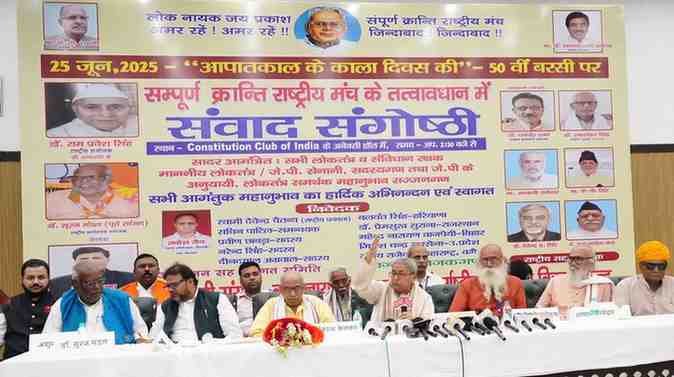New Delhi: On the occasion of the 50th anniversary of the Emergency, a significant gathering of democracy fighters, political leaders, and social activists was held at the Constitution Club in Delhi.
Organized jointly by the Sampoorna Kranti Rashtriya Manch and the Loknayak Jaiprakash International Study Development Center, the JP Senani Sammelan served as a platform to reflect on the dark days of the Emergency and to deliberate on the current challenges to democracy.
The event witnessed the participation of prominent figures from across the country, including former Union Ministers Satyanarayan Jatiya and Vijay Goel, Suraj Mandal, Suryakant Kelkar, Sunil Deodhar, Anshuman Joshi, senior journalist Sudhanshu Ranjan, and MLA Sudhakar Singh, along with numerous democracy fighters and representatives of social organizations.
Demand for Uniform Pension and Recognition
A key highlight of the Sammelan was the adoption of a resolution demanding equal pension benefits and national recognition for all individuals who were jailed during the Emergency.
The speakers also put forth a proposal for the establishment of an international museum dedicated to Loknayak Jaiprakash Narayan, whose leadership became a symbol of resistance during the 1975–77 Emergency. Another notable demand was the official recognition of June 25 as ‘Democracy Defense Day’.
Voices from the Event
In his address, Satyanarayan Jatiya, former Union Minister, paid rich tributes to Jayaprakash Narayan, Nanaji Deshmukh, and other democracy fighters. “These brave individuals were immortal lamps of democracy.
During the Emergency, the sun of resistance may have been eclipsed, but the sacrifices made reignited the spirit of liberty,” he said. Quoting JP’s famous slogan “Singhasan khali karo, janata aati hai”, he emphasized its role in mobilizing people against authoritarian rule.
Sunil Deodhar, BJP leader and Andhra Pradesh in-charge, recalled his family’s personal connection to the resistance. “I was just 10, but my father, a journalist and an RSS member, made our Pune home a hub for underground activities.
Many unsung heroes and their families, particularly women, bore immense hardships and deserve national honor,” he said. He also reminded the audience how civil liberties were curtailed under Emergency through the suspension of Articles 352 and 19, and the misuse of laws like MISA (Maintenance of Internal Security Act).
Former Union Minister Vijay Goel reflected on his experiences as a student activist at Delhi University during that time. “We went underground and distributed pamphlets on bicycles.
Leaders like Atal Bihari Vajpayee and Jayaprakash Narayan were jailed overnight. It felt like a second freedom struggle,” he said. He urged today’s political leadership to remain committed to democratic values, especially while in power.
Suryakant Kelkar, convener of the Bharat Raksha Manch, spoke on the continued marginalization of those who had fought to restore democracy. “The nation has not done justice to these patriots. It’s time their contributions are officially recognized and their dignity restored,” he noted.
Former MP Suraj Mandal stated that the Emergency was a direct assault on the Constitution and democratic institutions. He emphasized the importance of acknowledging the sacrifices made by democracy fighters at the national level.
Senior journalist Sudhanshu Ranjan provided a historical overview of the Emergency, calling it a “dark chapter” that witnessed the suppression of the judiciary, press, and Parliament. “The younger generation must learn about this period so that such mistakes are never repeated,” he said.
Social thinker Anshuman Joshi highlighted the plight of those who jeopardized their personal and professional lives for the sake of the nation. “Even today, many of them live in neglect. The government should ensure financial aid and social recognition for these heroes,” he added.
In his closing remarks, Sudhakar Singh, MLA from Ghosi (Mau), expressed deep respect for the democracy fighters and called for their contributions to be properly recorded in the annals of Indian history. He reiterated the need for national honors and institutional memory to preserve their legacy.
Key Resolutions
The Sammelan concluded with a formal resolution presented to the central government, listing the following demands:
- Implementation of a uniform pension scheme across all states for those imprisoned during the Emergency.
- Establishment of an international-level museum in honor of Loknayak Jaiprakash Narayan.
- Official declaration of June 25 as ‘Democracy Defense Day’, to commemorate the fight against authoritarianism and uphold constitutional values.
As the nation marked half a century since one of its most controversial political chapters, the gathering served not only as a reminder of past struggles but also as a call to protect democratic ideals in contemporary times.








